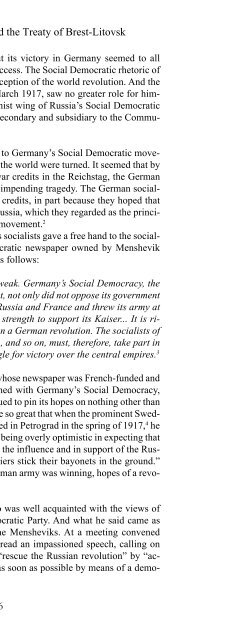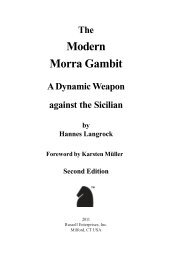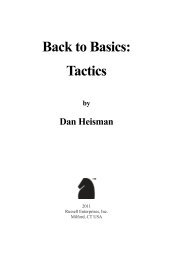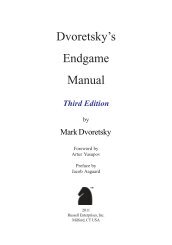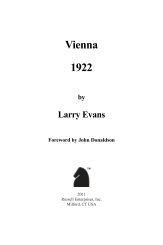<strong>Lenin</strong>, <strong>Trotsky</strong>, <strong>Germany</strong> <strong>and</strong> <strong>the</strong> <strong>Treaty</strong> <strong>of</strong> <strong>Brest</strong>-<strong>Litovsk</strong>government should fall because <strong>of</strong> this.” 12 <strong>Lenin</strong>, however, was playing his owngame in <strong>the</strong> negotiations <strong>and</strong> seeking to obtain a temporary truce with <strong>the</strong> Germanimperial government, seeing in this his only means <strong>of</strong> preserving power in hisown h<strong>and</strong>s <strong>and</strong> <strong>of</strong> splitting up <strong>the</strong> unified capitalist world, i.e., his aim was t<strong>of</strong>orm an alliance with <strong>Germany</strong> against Engl<strong>and</strong> <strong>and</strong> France.Liebknecht saw <strong>the</strong> promise <strong>of</strong> victory in a German revolution. <strong>Lenin</strong> saw it inplaying on <strong>the</strong> contradictions between <strong>the</strong> Central Powers <strong>and</strong> <strong>the</strong> Triple Entente.Liebknecht was interested in seeing <strong>Germany</strong> lose <strong>the</strong> war as quickly as possible.<strong>Lenin</strong>, in signing a separate peace, wanted to see <strong>Germany</strong> avoid losing <strong>the</strong> warfor as long as possible. He feared that Soviet rule in Russia would be overthrownby <strong>the</strong> joint efforts <strong>of</strong> <strong>Germany</strong> <strong>and</strong> <strong>the</strong> Triple Entente as soon as a peace treatywas signed on <strong>the</strong> Western Front. 13 But in signing <strong>the</strong> <strong>Treaty</strong> <strong>of</strong> <strong>Brest</strong>-<strong>Litovsk</strong> <strong>and</strong>delaying <strong>Germany</strong>’s defeat, <strong>Lenin</strong> was doing exactly what Liebknecht hadeffectively accused him <strong>of</strong> doing: sabotaging <strong>the</strong> German revolution. 14 It is notsurprising that <strong>the</strong> signing <strong>of</strong> <strong>the</strong> <strong>Brest</strong>-<strong>Litovsk</strong> <strong>Treaty</strong> led to a split within <strong>the</strong>Bolshevik Party <strong>and</strong> within <strong>the</strong> Soviet government <strong>and</strong> to <strong>the</strong> formation <strong>of</strong> a leftopposition – an opposition that, for <strong>the</strong> first <strong>and</strong> last time, operated openly <strong>and</strong><strong>of</strong>ficially within <strong>the</strong> Bolshevik Party as an autonomous organization <strong>and</strong> evenhad its own newspaper. Meanwhile, <strong>Lenin</strong>, who had emerged nominally victorious<strong>and</strong> forced <strong>the</strong> party to agree to <strong>the</strong> peace treaty, began losing his power over <strong>the</strong>party. Decisions carried out by <strong>the</strong> Bolshevik leadership were made more <strong>and</strong>more <strong>of</strong>ten against his will. His own bro<strong>the</strong>rs-in-arms could not forgive him soeasily for <strong>the</strong> “rotten compromise” with <strong>the</strong> Kaiser’s government <strong>and</strong> <strong>the</strong> lostchance for a quick revolution in <strong>Germany</strong>.<strong>The</strong> <strong>the</strong>oretical <strong>and</strong> ideological defects <strong>of</strong> <strong>Lenin</strong>’s <strong>Brest</strong>-<strong>Litovsk</strong> policy, however,were far less noticeable than <strong>the</strong> practical ones. Despite imposing extremelydifficult conditions on Russia <strong>and</strong> <strong>the</strong> Bolshevik Party, <strong>the</strong> <strong>Treaty</strong> <strong>of</strong> <strong>Brest</strong>-<strong>Litovsk</strong>had resulted nei<strong>the</strong>r in <strong>the</strong> coveted armistice, nor in <strong>the</strong> “respite” promised by<strong>Lenin</strong>. From <strong>the</strong> point <strong>of</strong> view <strong>of</strong> <strong>the</strong> German leadership, <strong>the</strong> <strong>Brest</strong>-<strong>Litovsk</strong>agreement was a “military measure <strong>and</strong> served merely as a means <strong>of</strong> aiding <strong>the</strong>Western Front, by eliminating <strong>the</strong> Eastern front <strong>and</strong> streng<strong>the</strong>ning <strong>the</strong> Westernfront, while simultaneously using <strong>the</strong> Eastern districts for economic purposes inorder to continue <strong>the</strong> war.” 15 This being <strong>the</strong> case, <strong>the</strong> deterioration <strong>of</strong> <strong>Germany</strong>’sposition in <strong>the</strong> West had to increase its appetite in <strong>the</strong> East. After <strong>the</strong> peace treatywas signed, military activity did not stop for a single day on most <strong>of</strong> <strong>the</strong> territory<strong>of</strong> <strong>the</strong> former Russian empire. <strong>Germany</strong> continued presenting new ultimatums<strong>and</strong> occupied entire districts <strong>and</strong> cities located to <strong>the</strong> east <strong>of</strong> <strong>the</strong> demarcation lineestablished by <strong>the</strong> <strong>Brest</strong>-<strong>Litovsk</strong> treaty. <strong>The</strong> <strong>Treaty</strong> <strong>of</strong> <strong>Brest</strong>-<strong>Litovsk</strong> turned out tobe merely an agreement on paper precisely because <strong>the</strong> two main partners in <strong>the</strong>peace talks – <strong>the</strong> Soviet <strong>and</strong> German governments – did not take <strong>the</strong> agreementseriously, did not consider it final, <strong>and</strong> most importantly, signed it not in order tosecure a peace, but only in order to continue <strong>the</strong> war, but under conditions thatwere more favorable to <strong>the</strong>m. <strong>The</strong> Bolsheviks were thinking <strong>of</strong> a revolutionary10
Introductionwar, <strong>the</strong> Germans <strong>of</strong> a war for a stable peace. As it turned out, even if <strong>the</strong> <strong>Treaty</strong><strong>of</strong> <strong>Brest</strong>-<strong>Litovsk</strong> did provide a respite, <strong>the</strong>n it was only for <strong>Germany</strong>, <strong>and</strong> onlyuntil November 1918.<strong>The</strong>re is no point in arguing that <strong>Lenin</strong> could have foreseen <strong>the</strong> consequences <strong>of</strong><strong>the</strong> <strong>Treaty</strong> <strong>of</strong> <strong>Brest</strong>-<strong>Litovsk</strong>. But it is evident that <strong>the</strong> majority <strong>of</strong> <strong>the</strong> party’s activistssaw <strong>the</strong> worst <strong>of</strong> <strong>the</strong>ir apprehensions realized. <strong>The</strong>y had supported <strong>Trotsky</strong>’sformula “nei<strong>the</strong>r war nor peace” before <strong>the</strong> peace treaty was signed. By <strong>the</strong>revolutionaries’ st<strong>and</strong>ards, <strong>Trotsky</strong>’s position was moderate. He did notcompromise Russian Bolsheviks in <strong>the</strong> eyes <strong>of</strong> <strong>the</strong> “German proletariat” by signinga peace treaty with <strong>the</strong> Kaiser’s imperialist government, but he also did not rushinto Bukharin’s impetuous adventurism, lacking <strong>the</strong> necessary strength. Like <strong>the</strong>Left Communists, <strong>Trotsky</strong> believed that signing a peace treaty would not guarantee<strong>the</strong> cessation <strong>of</strong> military operations, that <strong>the</strong> revolutionaries had no reason to trust<strong>the</strong> “imperialists,” that <strong>Germany</strong> would continue to take <strong>of</strong>fensive action when itcould. And under such circumstances, it was better to sign no documents at all,but to appeal to <strong>the</strong> proletariat <strong>of</strong> all countries <strong>and</strong> even to make use <strong>of</strong> <strong>the</strong> TripleEntente’s assistance.During those months <strong>the</strong>re was a widespread view in revolutionary circles that<strong>Germany</strong> was in no condition to take <strong>of</strong>fensive action, <strong>and</strong> that even if it didmanage to launch an <strong>of</strong>fensive, it would not be able to hold on to occupiedterritories without paying for this with an uprising in Berlin. <strong>The</strong> Bolsheviksbecame even more confident <strong>of</strong> this after <strong>the</strong> assassination <strong>of</strong> <strong>the</strong> Germanambassador, Count Wilhelm von Mirbach, in Moscow on July 6, 1918: after <strong>the</strong>German ultimatum that was received in response to <strong>the</strong> killing was categoricallyrejected by <strong>the</strong> Soviet government, <strong>the</strong> whole incident was consigned to oblivionby <strong>the</strong> Germans <strong>the</strong>mselves. Subsequently, until <strong>the</strong> <strong>Brest</strong>-<strong>Litovsk</strong> treaty wasannulled first by <strong>the</strong> German government (October 5, 1918), <strong>and</strong> <strong>the</strong>n by <strong>the</strong>Soviet government (November 13, 1918, two days after <strong>Germany</strong>’s capitulationin <strong>the</strong> First World War), a legal truce endured between Russia <strong>and</strong> <strong>Germany</strong>. InOctober-November, <strong>the</strong> truce was terminated, although <strong>Germany</strong> <strong>and</strong> Russia didnot declare war on each o<strong>the</strong>r. <strong>The</strong> two countries thus established formal relationswith one ano<strong>the</strong>r that looked a great deal like <strong>Trotsky</strong>’s formula – “nei<strong>the</strong>r warnor peace.”Such a state <strong>of</strong> affairs, according to <strong>Trotsky</strong>’s plan, was <strong>of</strong> course nothing morethan a respite, preparing <strong>the</strong> Bolshevik Party for its next move: revolutionary war(except by contrast with <strong>Lenin</strong>’s respite, <strong>Trotsky</strong>’s respite did not have to be paidfor by <strong>the</strong> Bolsheviks with an agreement with “imperialists”). This revolutionarywar began on November 13, 1918, when <strong>the</strong> Bolsheviks launched a decisivewestward <strong>of</strong>fensive. It was more than successful, <strong>and</strong> by February 1919, Soviettroops had passed through Vilno <strong>and</strong> reached <strong>the</strong> border <strong>of</strong> Eastern Prussia. Bythis time, Soviet republics had already been proclaimed in a number <strong>of</strong> nor<strong>the</strong>rn<strong>and</strong> central German cities.11
- Page 2 and 3: Lenin, Trotsky, Germanyand the Trea
- Page 4 and 5: Table of ContentsIntroduction 5Chap
- Page 6 and 7: Lenin, Trotsky, Germany and the Tre
- Page 8 and 9: Lenin, Trotsky, Germany and the Tre
- Page 12 and 13: Lenin, Trotsky, Germany and the Tre
- Page 14 and 15: Lenin, Trotsky, Germany and the Tre


